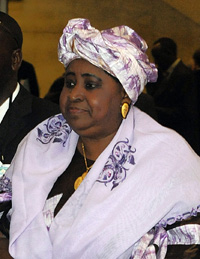The Gambia has an image problem: Dubbed the “Smiling Coast of Africa,” it is a tourist destination, but its government has one of the region’s worst records of human rights abuses. On Tuesday, at an African tourism promotion event in New York City, Gambian Vice-President Isatou Njie-Saidy headed a delegation working toward improving the negative perceptions of the country.
In a discussion with Njie-Saidy after the event, I mentioned to her that an Internet search of the Gambia yields many results about its human right abuses. In response, she shifted the topic to the United States: “Do they tell you about Guantánamo Bay? Seems like a human rights issue,” she said. “And, you know, in the Internet, you have a lot of garbage. … Don’t believe everything you read: You have to look in between.” She later accused social media of peddling untruths: “Social media is the problem,” she said.
Accordingly, I brought up to the vice-president the well-documented case of a journalist whose detention in government custody for more than five years has left his family, friends, and colleagues in anguish. The case of Ebrimah “Chief” Manneh, a reporter whose whereabouts, legal status, and health have been unknown since Gambian state security agents arrested him in 2006 at his office at the pro-government Daily Observer, was not unfamiliar to the vice-president. In fact, six U.S. senators, UNESCO, and a West African human rights court have called on the Gambia to end its illegal detention of the journalist.
Despite this, the vice-president told me, “The government didn’t arrest him. At the same time, people make up stories. Who knows what happened to Manneh? We don’t know–I cannot answer, because I don’t know.” She then suggested that the journalist may have gone missing while attempting to immigrate to Europe. “There are people who die in the desert–anything can happen to anybody,” she said.
Njie-Saidy’s government has deprived Manneh of his freedom and, more recently, referred to the journalist’s death. Still, the vice-president denied any responsibility in accounting for his fate. “That incident, as far I know–I don’t know anything about it,” she told me.
CPJ’s Dario Reais contributed to this story.
